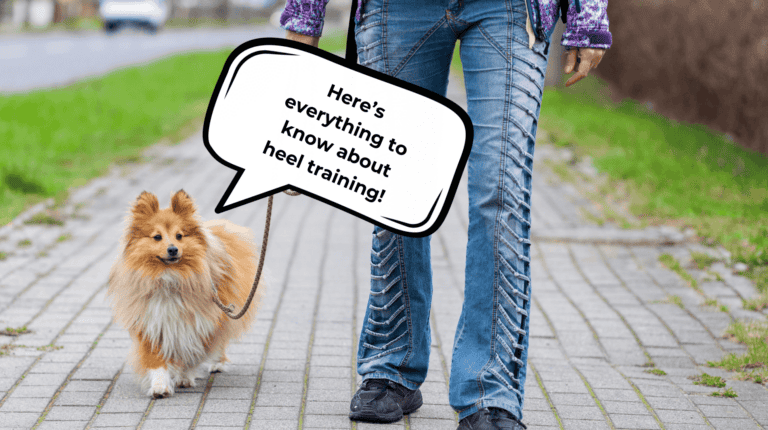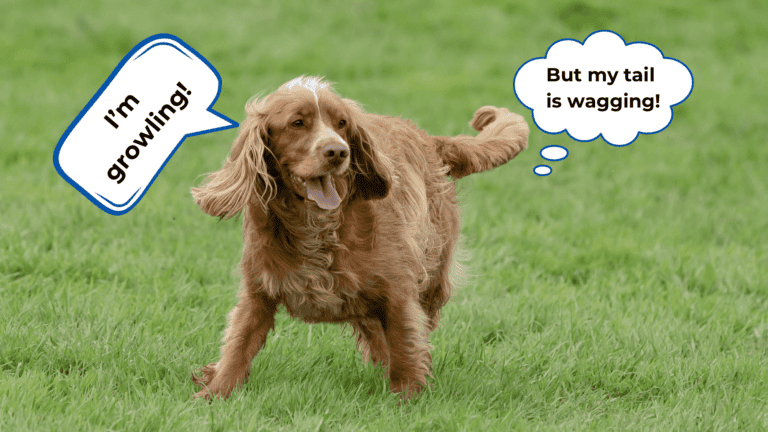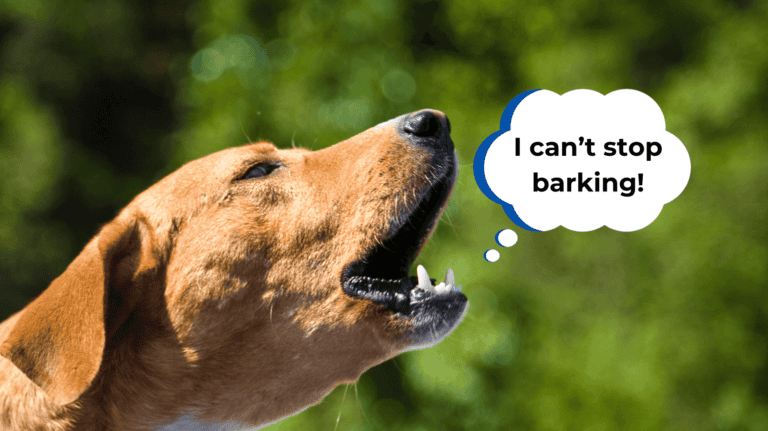What affects dog behavior can be traced back to multiple factors — dog personality, dog-owner relationship, their past history, and even the environment where they live!
No dog is ever the same as another — and that’s the beauty of raising them. Each dog has a unique quirk that makes them so lovable.

However, in my years as a dog trainer, I have also had dog consultations specifically for certain dog behaviors that were driving owners crazy!
“I don’t want to compare, Doggy Dan, but ONLY my dog does this. And I don’t know what’s going on.”
Perhaps you’ve felt this, too: your dog showing a different behavior that you feel is unique and causing problems.
As dog parents, we just want to know what affects our dog’s behavior — and ways to correct it. But I always believe that before we jump into the solutions, we have to know what influences dog behavior first.
The roots. The main cause. Then we shoot for the remedies.
If you want to know why your dog acts a certain way, read on.
Key Takeaway:
- As a dog owner, you have the biggest influence in a dog’s behavior, so it’s crucial to always keep your emotions and energy in check.
- Breed, past history, training, health, and experience with socialization has an impact to your dog’s overall behavior.
- There’s no such thing as “too old” when it comes to correcting behavior. Your mature dogs can still be taught.
LEARN THE DOG CALMING CODE (FOR FREE)
Table of Contents:
- What Affects Dog Behavior: The Story of Frisbee, the Dog Terrified of Flies
- How Dog Owners Affect Dog Behavior
- What Affects Dog Behavior: 7 Factors That Influence How Dogs Behave
- Change Dog Behavior: How to Correct and Improve Dog Behavior
- Can I Still Improve the Behavior of My Old Dog?
- How the Dog Calming Code Affects Dog Behavior for the Better
What Affects Dog Behavior: The Story of Frisbee, the Dog Who Was Terrified of Flies
Dog owners are a dog’s FIRST dog trainers. And I have seen wonderful dog owners who have trained their dogs wonderfully!
I have also seen other owners who have trained their dogs to react in ways they couldn’t imagine.
In this blog, I will be featuring the story of an ALMOST perfect dog…who had a very odd fear of flies.
(Watch the full video below for Frisbee’s story.)
Frisbee — the dog — baffled his owners for a dog behavior that was unique to him: he would leap, jump, become restless, and bark non-stop, just at the sight of a single fly.
“Doggy Dan, this is such a puzzling dog behavior,” his owner said, “I have never seen a dog as scared of flies as he is.”
During the course of our consultation, the owner finally said something that helped me understand what influenced Frisbee’s dog behavior.
“Is it possible that our sensitivity to flies made him act the way he does?” his owner asked while showing me the fly swats each family member had.

All of them had fly swats! The entire family had their very own fly swats, and would smash away at any fly in the vicinity.
It finally made sense!
Frisbee’s dog behavior was affected by his household’s strong dislike for flies.
The poor dog must have been feeling like a fly invasion is a life-and-death thing!
What’s my point to this?
I want each dog owner to understand the first factor that affects dog behavior: YOU.
GET MY 5 GOLDEN RULES FOR FREE!
How Dog Owners Affect Dog Behavior
Dog owners, your dog spends more time with you than with anyone else.
And it’s understandable considering that statistics say almost 70% of dog owners prefer to spend time with their dogs!

That amount of time spent with your dog can significantly affect dog behavior… for good or for bad.
How can dog owners affect, change, or influence dog behavior? Check out the list below.
#1: Dogs are Imitators — They Copy Dog Owners!
Just like in the story of Frisbee, it was his owners who influenced his fear of flies.
You see, dogs are great imitators.
There was a news article once of a man who developed a limp due to a fall, whose dog suddenly started limping as well.
He took his dog to the vet and it turned out that the dog had zero leg issues — the dog was simply mimicking their owner.
Our action as dog owners are what affects dog behavior. Because our dogs love us, and are loyal to us, and look up to us, they think that whatever we do IS right.

And that could be a big problem if we don’t keep our behavior in check.
#2: Your Dog Takes on Your Energy
I say this over and over and over again: because you’re always with them, dogs take on your energy, and the energy of their surroundings.
And energy is one of the biggest drivers of dog behavior.
The emotions that we feel — anxiety, stress, sadness, nervousness, and fear — are apparent to our dogs. They see our emotions and dogs can feed off our energy. Because they take on our heavy emotions, dogs can display negative behavior, like non-stop barking because of anxiety or aggression because of fear.
FREE REACTIVITY MASTERCLASS
#3: Dog Behavior Is Affected by Leadership at Home
Dogs need to see leadership in place.
In my online dog training program, the Dog Calming Code™️, I emphasize that dog owners should be in charge. Not their dog, but them.
Why? Because dogs are pack animals, and it comes natural to them to look for a leader in the home.

If you don’t show your dog that you’re the leader, that you’re in charge, your dog will be forced through their natural instincts to assume that role.
And when your dog feels like they are the leader, it affects dog behavior. This is where issues like increased dog anxiety, restlessness, aggression, separation anxiety, and non-stop barking manifest.
#4: The Secret to Dog Training Lies in the Hands of Dog Owners
With the right dog training program and foundation, you will learn the best ways to correcting dog behavior.
Additionally, you will not feel lost! You will know what to do…
I encourage dog owners to understand this: a proven dog training program can influence how a dog sees you, how they behave inside and outside the home, and their behavior towards you and other dogs.
And a dog training program tailored to help you connect with your dogs can influence dog behavior tremendously.

However, as a dog owner, you have to understand that YOU are the one who really needs to push for dog training.
When you’re committed to train your dog, correcting dog behavior becomes more manageable.
#5: Dogs are BIG Observers
In my previous blog, I talked about how dogs are big observers.
Even without saying a word, dogs can understand us by the way we talk, the way we react, the way we speak, and the way we change our routines.
Dogs assess us through a combination of body language, tone change, and overall energy. How we react to certain people or circumstances can be adapted by our dogs.

Our behavior can influence our dog’s behavior… all because our dogs are keenly observing us.
REVERSE REACTIVITY (FREE WEB CLASS)
What Affects Dog Behavior: 7 Factors That Influence How Dogs Behave
Apart from us, their owners, what else affects dog behavior?
I have listed seven of the biggest factors that influence how dogs behave, and these influences can range from internal to environmental.
Factor #1: Breed
Different dog breeds have been selectively bred for specific traits and purposes.
These breed-specific traits can greatly impact a dog's behavior.
For example, herding breeds may have a strong instinct to chase and control movements, while retrievers may have a natural inclination to fetch and carry objects.
Factor #2: Socialization
Socialization changes dog behavior through play and exposure to other people and animals. Proper exposure during their critical socialization period (typically between 3 and 14 weeks of age) can increase a dog’s confidence and eliminate feelings of fear and anxiety.

A well-socialized dog also has an increased tendency to have better manners and behavior around both people and animals.
Factor #3: Training and Education
The training dogs receive during their early weeks has a significant impact on their behavior.
Picture this: a dog whose been trained to obey due to fear. Shouting is heavily involved in the process.
Can you tell me that the dog — when it’s time for behavior correction — won’t be terrified when his name is called?

When we compare them to a dog raised and trained using a holistic dog training program, we can see that dogs trained the better way are more confident, less anxious, obedient, and yes, even fun!
Factor #4: Environment
The environment in which a dog lives can greatly influence their behavior.
Factors such as the amount of physical exercise, mental stimulation, social interaction, and the presence of potential stressors (e.g., loud noises, crowded spaces) can all impact a dog's overall behavior and well-being.
Factor #5: Health and Genetics
A dog's physical and mental health, as well as their genetic makeup, can contribute to their behavior.
Certain medical conditions or genetic predispositions may influence a dog's temperament, energy levels, or susceptibility to behavioral issues.
Because of that fact, regular veterinary care is essential to address any underlying health concerns that may affect behavior.
Factor #6: Life Experiences
Past experiences, such as traumatic events or positive encounters, can leave lasting impressions on a dog's behavior.
Dogs who have had negative experiences may exhibit fear, anxiety, or aggression in certain situations.

Understanding a dog's history can provide valuable insights into their behavior and help tailor appropriate training and behavior modification techniques.
Factor #7: Individual Personality
Just like humans, dogs have their own unique personalities.
Some dogs may naturally be more outgoing and friendly, while others may be more reserved or independent.
Understanding and respecting a dog's individual temperament and preferences can help create an environment that supports their well-being and encourages positive behavior.
REACTIVITY SOLVED (NO FOOD, NO FORCE)
Change Dog Behavior: How to Correct and Improve Dog Behavior
#1: Make Sure Your Dog Understands What Behavior is Acceptable and What is Not
The first step to changing dog behavior is through letting your dog know what is good and what is not.
For example, dogs who follow a routine or a command get a reward, while dogs who misbehave get a timeout.

Ensure that you stick to these rules because eventually, dogs will catch on what they should and should not do. They are incredibly fast learners!
#2: Find Out What is Causing Dogs to Have Behavioral Issues
Dog behavior problems come from a deeper reason and not just from their want to misbehave.
Check on an anxious dog and see if their restlessness is caused by taking on the role of a leader. Check through the history of your aggressive dog for experiences or trauma that could cause aggression.
Dog behavioral training is not done in a cookie-cutter style. You have to truly understand your dog to incorporate a method that will create a difference.
JOIN MY FREE REACTIVITY CLASS
#3: Emphasize Correct Behavior Through Positive Reinforcement
Treats, hugs and kisses, attention, a pat, or even play time are powerful rewards for dogs. And when used in correcting dog behavior, dogs can learn fast what actions or habits to continue, and which one to drop.
#4: Get the Help of a Dog Trainer or an Online Dog Training Program
I understand — training can get absolutely stressful!

Instead of spending more time trying to figure out what training benefits your dog’s behavior more, get the help of a professional dog trainer OR get an online dog training program to guide you.
Can I Still Improve the Behavior of My Old Dog?
Not only can you teach an old dog new tricks, but you can still improve dog behavior even when they’re old.

Whether you got your mature or senior dog through adoption, or had them since they were puppies, you can still correct dog behavior.
Older Dogs Are Less Distracted, So They’re More Focused to Training
The best thing about improving the behavior of older dogs is that these dogs are less restless. They are more chill, and have more focus to listen to you.
Older, senior dogs are also more mellow and don’t run around with an abundant amount of energy. Training with them can be less stressful!
LEARN THE DOG CALMING CODE (FOR FREE)
How the Dog Calming Code Affects Dog Behavior for the Better
When I created the Dog Calming Code, I had this picture in mind: a dog owner FINALLY breathing out a sigh of relief.
“Finally, a dog training program to help me improve my dog’s behavior without the stress!”
Here’s what I want you to know about my online training program for dogs: the Dog Calming Code is an intuitive program that dogs can easily adapt to.
Dogs respond naturally to my training because they know the foundations I teach are what make dogs feel heard, seen, and understood.

The Dog Calming Code does not use fear to make dogs listen or respond to training or behavior correction.
Instead, it uses principles that dogs understand and connect to.
It transforms you, the dog owner, into not just a human being in the eyes of your dog, but a leader who’s in charge. A leader they can trust and make them feel “Don’t feel anxious. I’m in charge. I got you.”
And after seeing the effects of the Dog Calming Code to 88,000 dogs, I can say that when dogs feel more understood and less “in-charge,” successful training eventually follows.
To learn more about the Dog Calming Code, check out the link here.
Remember: you have the power to influence your dog’s behavior. With the right training, and the proper foundations, you can raise and train a dog to great behavior.
You got this!

~ Doggy Dan







